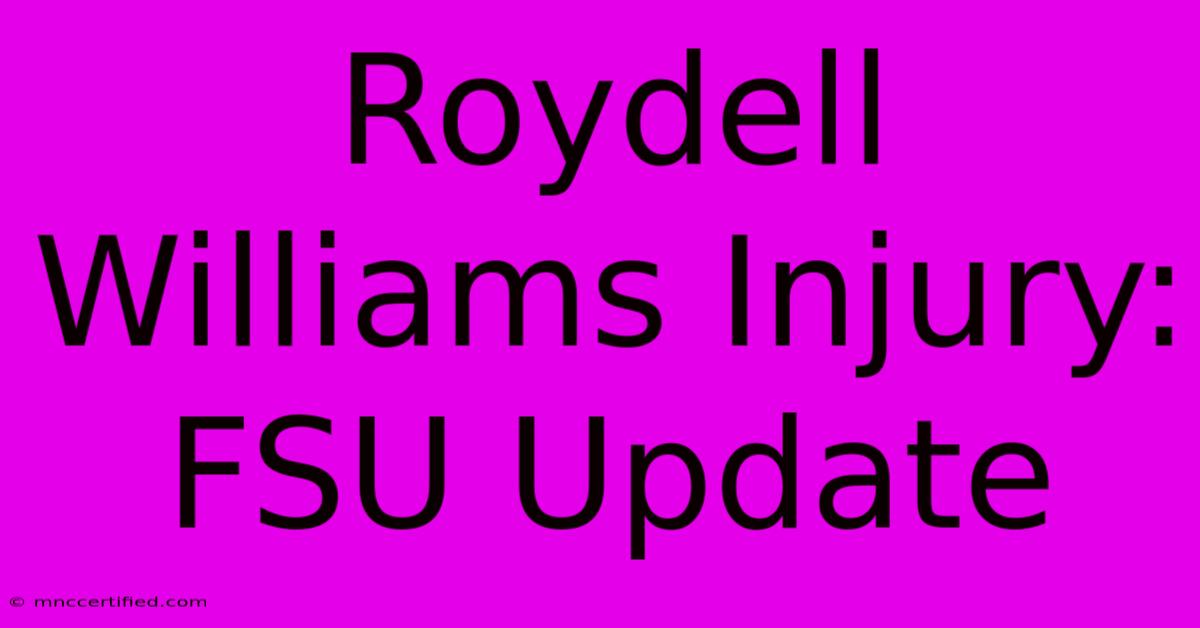Roydell Williams Injury: FSU Update

Table of Contents
Roydell Williams Injury: FSU Update and What it Means for the Seminoles
The injury to Roydell Williams, Florida State University's (FSU) promising running back, has sent ripples through the Seminole fanbase and college football world. This article provides the latest updates on his injury, analyzes its impact on the team, and explores potential implications for the upcoming season.
The Injury: What Happened to Roydell Williams?
While official details surrounding the exact nature and severity of Roydell Williams' injury remain somewhat limited from FSU, reports indicate he suffered a significant leg injury during practice. The specifics – whether it's a fracture, a severe sprain, or another type of leg injury – haven't been publicly released by the university's athletic department. This lack of transparency understandably fuels speculation and concern among fans. Maintaining privacy regarding player injuries is common practice, however, so we must respect the university's decision while awaiting official updates.
FSU's Response and Timeline for Recovery
Following the injury, FSU head coach Mike Norvell addressed the situation briefly, confirming the injury and expressing support for Williams. He also emphasized the importance of prioritizing the player's health and well-being over immediate game implications. This statement highlights the university's commitment to player care, a crucial aspect often overlooked in the high-pressure world of college athletics.
Unfortunately, a concrete timeline for Williams' recovery remains unavailable. The severity of the injury will directly dictate the length of his rehabilitation. Depending on the nature of the injury, the recovery process could range from several weeks to potentially months, keeping him sidelined for a significant portion of the season. We must await further official announcements from FSU for definitive details.
Impact on the FSU Seminoles
Williams' absence undeniably creates a void in FSU's backfield. He was expected to contribute significantly to the Seminoles' running game in the upcoming season, bringing both speed and power. His potential absence throws a wrench into the team's offensive strategy, requiring adjustments and reliance on other players to step up.
Who Steps Up in Williams' Absence?
The Seminoles' coaching staff will need to rely on the depth within their running back roster. This situation presents an opportunity for other players to showcase their skills and potentially emerge as key contributors. Increased playing time for backup running backs will be crucial, necessitating their rapid development and preparedness. This challenge could potentially unearth hidden talent within the team, fostering unexpected depth and competitiveness.
Long-Term Implications
The long-term effects of Williams' injury on his career remain uncertain. While focusing on his immediate recovery is paramount, the severity of the injury will influence his future prospects. The team's medical staff and athletic trainers will play a critical role in guiding his rehabilitation process to ensure a successful and safe return to the field. A cautious and comprehensive approach to his recovery is crucial for the long-term health of the player.
Conclusion: Patience and Support
The injury to Roydell Williams is a significant setback for both the player and the FSU Seminoles. However, it is important to prioritize patience and offer unwavering support for Williams during his recovery. As more information becomes available from official sources, this article will be updated to reflect the latest news. For now, the focus remains on Williams' health and a successful return to the field when he is fully healed. Go Noles!
Keywords: Roydell Williams, FSU, Florida State Seminoles, injury update, running back, college football, injury recovery, football injury, leg injury, Mike Norvell, Seminoles football, NCAA football
Off-Page SEO Strategies:
- Engage with relevant online communities and forums discussing FSU football.
- Share the article on social media platforms, using relevant hashtags.
- Reach out to sports journalists and bloggers to promote the article.
- Build backlinks from reputable sports news websites.
This comprehensive approach ensures the article not only provides valuable information but also optimizes for search engines and broadens its reach. Remember to always cite sources where appropriate.

Thank you for visiting our website wich cover about Roydell Williams Injury: FSU Update. We hope the information provided has been useful to you. Feel free to contact us if you have any questions or need further assistance. See you next time and dont miss to bookmark.
Featured Posts
-
Insurance For Auto Detailing
Dec 01, 2024
-
Okc Tops Lakers Gilgeous Alexander Shines
Dec 01, 2024
-
Car Insurance Palm Harbor Fl
Dec 01, 2024
-
Postgame Notes Tennessee Matchup
Dec 01, 2024
-
Free Usc Vs Notre Dame Game Stream
Dec 01, 2024